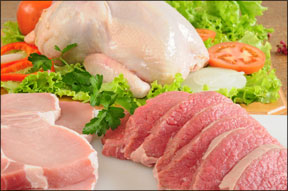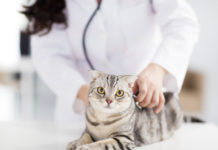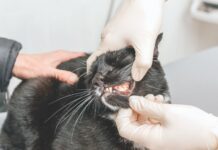Dear Elizabeth, Ive been doing a lot of thinking about what cats eat “in the wild” and would like feed my cat, Cob, as close to a natural diet as possible. Im not prepared to catch mice and birds for him, but I am willing to make his meals. I am especially interested in feeding him raw foods. What are your thoughts concerning my plan? In my younger days, I lived “in the wild” and caught my own meals. I have to say that I much prefer the well-rounded, delicious meals that appear on a regular schedule here at the Feline Health Center. For one thing, I no longer have internal parasites to deal with (rabbits are full of tapeworms!). Still, I appreciate the thought youve put into Cobs diet and your willingness to prepare his food. While Ive heard of cats that have done well on homemade raw diets, I have also overheard the doctors here talking about some of the dangers that can occur with these diets. One of the main problems is ensuring that the diet is nutritionally balanced. Although it may appear that cats can live and even thrive scrounging for food on Bev Caldwell 288 their own, a cats nutritional requirements are actually quite complex. When cats eat prey, they ingest the whole animal – and it can be hard to duplicate this “complete” diet with muscle meats and other foods obtained from a grocery store. It also takes a lot of time, expense and knowledge to prepare a well-balanced diet, and many published recipes for home cooked pet diets have been found to be nutritionally incomplete. Even when the diet is balanced, it needs to be prepared so that picky cats cant selectively eat only certain ingredients. Unbalanced Diets & Nutritional Diseases. The veterinary literature is full of documented cases linking improper diets to nutritional diseases, some of which are fatal. Well-meaning owners feeding all-meat diets have caused serious calcium deficiencies resulting in catastrophic bone fractures. While bones contain calcium, feeding cooked bones may cause intestinal blockages or perforations, leading to peritonitis (a potentially fatal infection in the abdomen). Large amounts of tuna fish can cause thiamine (vitamin B1) deficiencies, resulting in neurologic disease (tuna cat foods are supplemented with thiamine to prevent problems). Deficiencies of the amino acid, taurine, result in blindness and cardiomyopathy (a potentially fatal weakness of the heart muscle). Interestingly, while muscle meats contain large amounts of taurine, grinding the meat can reduce taurine levels enough to cause deficiencies. Excessive amounts of vitamin A (which can occur if liver makes up a large part of the cats diet) can cause skeletal problems resulting in pain and lameness. Excesses of certain minerals may lead to kidney or bladder stones. These are just a few of the many nutritional diseases cats face when improper diets are fed. There are additional concerns pertaining to raw diets. Raw meat and commercially available raw diets often contain bacteria (E. coli, Salmonella, Listeria, Campylobacter). Raw diets may lead to severe bacterial illnesses in both cats eating the diets and in people exposed to the bacteria either during preparation of the foods or through contaminated items. Individuals with compromised immune systems (the very young and the very old, cancer patients undergoing chemotherapy, cats infected with FIV or FeLV) are most at risk. Immunocompromised pets shouldnt be fed raw meats, nor should these diets be fed if there are immunocompromised people in the household. If youve made up your mind, you should consult your veterinarian or a veterinary nutritionist for up-to-date and balanced recipes, and for tips on handling raw foods safely. Veterinary nutritionists can be found at most veterinary colleges and an on-line service, run by veterinary nutritionists, will customize recipes for individual pets (see BalanceIt.com). Love, Elizabeth 



